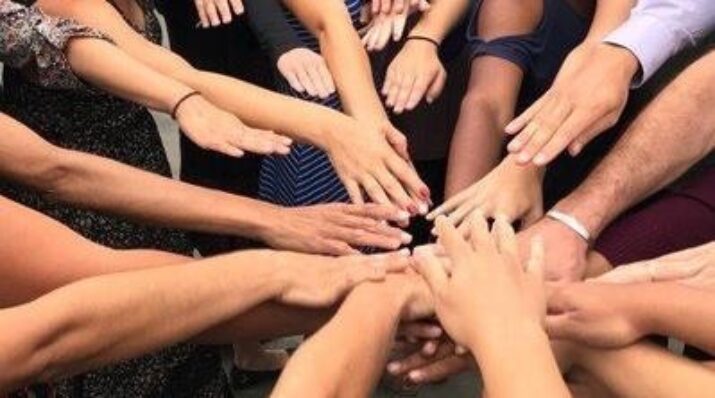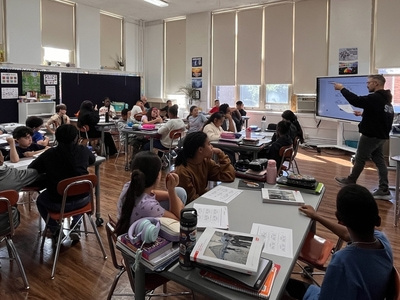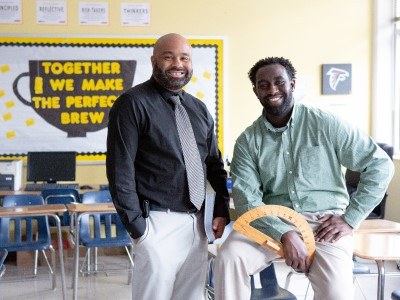Professional Learning
Professional Development Reimagined: What It Means for Teaching and Teachers
Topics

Educators are the lead learners in schools. If they are to enable powerful, authentic, deep learning among their students, they need to live that kind of learning and professional culture themselves. When everyone is part of that experiential through-line, that’s when next generation learning thrives.
What happens when teachers are given the same experiential learning experiences as students? It's transformative.
While students and families are enjoying an extended winter break, Thrive teachers and leaders return to the school for a week of connection and collaboration. They will fine-tune instructional practices and prepare their classrooms for the students' return. They will also sit in circles together, running through the routine of morning meeting and building their community in Council. They are adult learners, going through experiential learning opportunities that emulate and enrich the work they each lead in their own classrooms.
What happens when teachers are given the same learning experiences as students? It's transformative. As we prepare to follow up our successful summer professional development with another week of experiential learning for our teachers, we know we've found an approach that truly makes a difference for our growth as a staff and as a school community. Here are just some of the benefits to reimagining professional development in a way that centers the student experience.
Innovative professional development:
Sets a Clear Vision
An engaging and powerful experiential professional development makes it very clear what teachers are expected to provide for their students and the type of work—collaborative, authentic, and meaningful—that should anchor our classrooms.
During our summer professional development, one group of teachers studying project-based learning partnered with the local YMCA to serve the children of military families attending summer camp. The teachers met with the children and learned about the challenges of having a parent in the armed services, then used the same tools and materials available to Thrive students to handcraft stuffed animals and write personal narratives connecting the stuffed animal to the child and the parent in the military.
Intervention coordinator Courtney Ochi said it was a powerful experience to create the perfect gift for the child she met, a girl with a dad about to deploy overseas. Her group ended up making a cheerleader fox with a green heart, along with a separate green heart for the father to bring with him when he travels. "It was an opportunity to actually try project-based learning and see what it is like to have a real-world audience," said Ochi. "By doing it yourself, you understand what the components are and how to make it meaningful."

Walks the Walk
An experiential professional development allows school leaders to model great learning. Thrive hires many new teachers, often through alternative pathways or university programs that emphasized theory and lecture. It's our responsibility to show our teachers what an excellent instructional environment looks and feels like, and we take every opportunity we have to immerse staff in productive learning.
1st and 2nd grade teacher Steve Askar said the experience of participating in Councils and project-based learning cycles helped him to think through how he would guide his students through the experiences. It gave him empathy for the challenges they would inevitably face while engaged in personal and authentic work. "The idea of doing what you're about to ask students to do in the classroom is a powerful thing," said Askar. During professional development, "I was in the trenches doing it myself, and at the end of the day that experience taught me the most."

Encourages Meta-Thinking
Doing the work that we will ask of our students also allows us to stop and notice what's happening—what works and why, what doesn't work, and what adjustments could be possible. In a more concrete and authentic way than any informational PD could offer, our expert teachers can make their work and thought processes transparent and actionable.
Ochi said she is looking forward to the winter professional development, where teachers who already tried one project-based learning unit during the first semester can use the experiential learning time to reflect on the process and consider where they could push students and themselves to try something new or go deeper in a second-semester unit.
Emphasizes Reflection
We know that people don't learn solely through experience, they learn through reflection on those experiences. Our closing meetings and connections during professional development provide a regular structure to slow down our thinking and, as a result, speed up the learning.
Askar said he uses this time to develop action plans for his classroom learning. "So much had happened, it was impossible not to reflect," he said.
"The idea of doing what you're about to ask students to do in the classroom is a powerful thing.... I was in the trenches doing it myself, and at the end of the day that experience taught me the most."
Allows for Differentiation
Our new teachers work alongside veteran staff at our summer professional development. We know that blended learning and parallel work time works for our students—this structure allows us to provide the same opportunity for our staff. Organizers aimed to draw on staff expertise in various areas, and to offer multiple pathways where teachers can select the areas where they will learn and grow. "Everyone is a novice and an expert," said Ochi.
All of these shifts in professional development add up to an experience that is more meaningful and personal for each teacher, and that is potentially transformative for a school.
"I've gone through lots of different PD experiences in my life," Askar reflected. "This just totally blew my mind of what's possible when it comes to PD. I think it's because of the sheer investment they are making in people and relationships. That's the foundation in everything else we do in the work."




